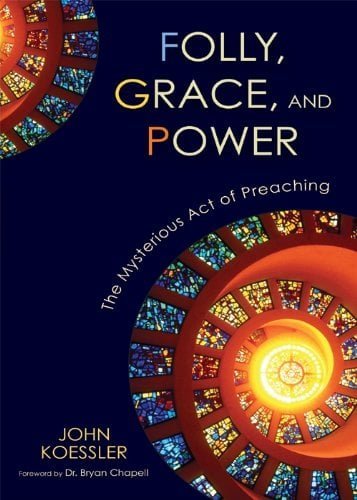⏱️ Estimated Reading Time: 3 min read
Most books devoted to exploring the mandate to preach the Word of God focus on homiletical method. They help young preachers craft an introduction and a conclusion. They help young theologians with good exegetical skills. They discuss tone, body language, and eye contact.
John Koessler’s new book, Folly, Grace, and Power: The Mysterious Act of Preaching is different. Koessler’s book is about the theology of preaching. The author explains, “Our preaching has the capacity to mediate the true presence of Christ. We display ‘the light of the knowledge of the glory of God in the face of Christ’ (2 Cor. 4:6). This dignifies preaching. But it does not elevate the preacher beyond measure. The all-surpassing power comes from God, not from us. We are nothing. God is everything.” This mindset permeates the remainder of the book as Koestler sets forth a biblical case for preaching.
Central to the message of this book is the sovereignty of God. The author observes, “We have influence over the dynamics of delivery, but not the ebb and flow of the Holy Spirit. He breathes on whomever he wills, and there are many times when we are unable to sense his presence or easily discern his purpose … A sermon which thunders in one service falls flat in another, and we cannot tell why.”
In an age where propositions have for the most part been relegated to the cemetery, Koessler argues that good preaching includes both propositions as well as a story: “God’s Word, of course, includes both proposition and story, employing argument to address reason and narrative to affect the heart. Both exert an important influence on the will. But it is the Spirit, ultimately, who convicts.” Here, the author stands with Jonathan Edwards who essentially argued the same in his magisterial volume, Religious Affections.
The sovereignty of the Spirit of God is emphasized as well: “He (the Holy Spirit) works in the preacher to ‘give’ words and boldness and then through what is preached to produce faith in those who hear … God’s Spirt also uses the sermon to stir the heart. The Word of God gains entry by the gate of the mind, but its ultimate target is the heart, where faith is exercised (Rom. 10:10).” This affection-oriented theme permeates the volume and makes it especially appealing to anyone convinced by the preaching methodology of Jonathan Edwards and the New England Puritans.
The author explores the importance of authority in preaching, a subject that causes postmodern sympathizers to cringe. Koessler warns, “Preaching with divine authority does not guarantee a smooth path. We would like to think that God-given authority gives us leverage … But the same Bible that gives us our authority also offers ample proof of the congregation’s capacity for discounting that authority.” Preaching with authority will, however, be costly. Thomas Long adds, “If the word comes from God in the biblical text, the preacher remains true to that word, regardless of the reaction or the cost.”
There is much to commend in this thoughtful volume. Preachers, young and old alike should devour this work and find encouragement in John Koessler’s fresh approach to preaching.




